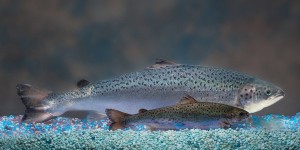01
Dec
Genetically Engineered Salmon without Labeling Approved by FDA
(Beyond Pesticides, December 1, 2015) Last month, the U.S. Food and Drug Administration (FDA) approved, without a labeling requirement, a genetically engineered (GE) salmon designed to grow faster and come to market quicker than other farmed salmon. The fish, dubbed AquAdvantage by its developer, Massachusetts-based biotechnology firm AquaBounty, has been the center of considerable controversy as it represents the first GE animal approved for commercial sale and human consumption. While FDA has declared the fish safe to eat, and AquaBounty argues the fish will help feed the world, opponents stress that the potential adverse effects of the technology have not been properly vetted, and consumers will have no way to tell whether the salmon they purchase at the store is the engineered AquAdvantage product.
 Draft guidelines released by FDA when the salmon was approved do not require retailers to inform consumers that the fish is GE. Instead, the agency provided examples of voluntary statements, such as “genetically engineered,” or “This salmon patty was made from Atlantic salmon produced using modern biotechnology,” that producers can consider using. The FDA policy makes it virtually impossible for shoppers wishing to avoid the GE fish to make an informed decision at the point of purchase. While most major food retailers, including Trader Joe’s, Aldi, Whole Foods, Kroger, Costco, Safeway, and Giant Eagle have announced they will not stock GE salmon, top retailer Walmart indicated it was too busy with Black Friday to issue a decision.
Draft guidelines released by FDA when the salmon was approved do not require retailers to inform consumers that the fish is GE. Instead, the agency provided examples of voluntary statements, such as “genetically engineered,” or “This salmon patty was made from Atlantic salmon produced using modern biotechnology,” that producers can consider using. The FDA policy makes it virtually impossible for shoppers wishing to avoid the GE fish to make an informed decision at the point of purchase. While most major food retailers, including Trader Joe’s, Aldi, Whole Foods, Kroger, Costco, Safeway, and Giant Eagle have announced they will not stock GE salmon, top retailer Walmart indicated it was too busy with Black Friday to issue a decision.
In order to avoid the fish at other grocery stores, at this point in time, shoppers can look for country of origin labels as a clue as to whether the salmon is genetically engineered. The salmon will be farm-raised in Panama, so avoiding salmon labeled “farm-raised” or “product of Panama” is a good way to stay avoid the GE product. However, note that processed salmon products, such as pre-packaged salmon burgers, are not subject to the same labeling requirements. Because there is no organic farm-raised salmon, this is a matter where looking for the organic seal will not help consumers avoid a GE food. To assist, the Center for Food Safety has put together a guide to help consumers avoid eating GE fish.
Concerns over labeling are buoyed by the potential for adverse human and environmental impacts resulting from the production of AquAdvantage salmon. Notably, FDA approved the fish under a provision within the Federal Food, Drug, and Cosmetic Act, for “new animal drugs.” Under this clause, FDA considers the growth gene inserted from the eel-like Ocean Pout into the GE salmon to “meet the definition of a drug,” according to the agency’s press release. Further, when applying this provision, companies are not required to disclose application data to the public. While data was disclosed during this process, advocates assert that FDA failed to consider numerous potential adverse impacts, and such a loophole does not bode well for the approval of future GE animals.
FDA asserts that it has determined that approval of the salmon would not significantly impact the environment because of “multiple and redundant measures being taken to contain the fish and prevent escape and establishment in the environment.” Conversely, in acknowledging that escapes can (and do) occur with farm-raised fish, the agency indicates the fish “would be unable to interbreed or establish populations in the wild.” However, a 2012 study from Canadian researchers found that AquAdvantage salmon have the potential to successfully crossbreed with brown trout. The study not only found that GE salmon can crossbreed with brown trout, but also that their GE hybrid offspring could outgrow wild salmon, non-GE hybrid offspring, and even GE salmon. The GE hybrids also out-competed wild salmon and GE salmon in simulated stream environments, further stunting the growth of other fish.
After the decision was announced last month, the Center for Food Safety announced plans to sue FDA in order to stop approval of the AquAdvantage Salmon.
For more information on the human environmental hazards associated with GE technology, and national and local efforts to label GE food, visit Beyond Pesticides’ Genetic Engineering webpage. While the organic seal does not exist for farmed seafood, controversial regulations are currently in the works. In order to support strong organic standards that provide an alternative to the conventional food market where GE products are not labeled, consumers must participate in the public process surrounding organic production. Visit Beyond Pesticides’ Keeping Organic Strong page for the latest on materials to be evaluated by the National Organic Standards Board. And, visit the Save Our Organic program page to ensure the public trust in the organic label is maintained.
All unattributed positions and opinions in this piece are those of Beyond Pesticides.
Sources: Civil Eats, FDA Press Release











Didn’t the FDA just pull that approval? I don’t buy Farm Raised Salmon anyway. My understanding is the meal that Farm-Raised fish are fed is Corn-Based which means GE Corn.
December 15th, 2015 at 5:19 am